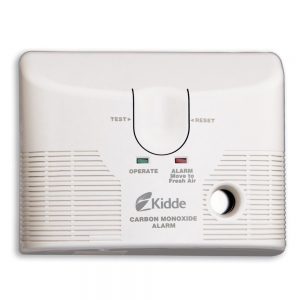Carbon monoxide is a well know hazard but one I think many of us take for granted. The CDC says that CO is found in fumes produced any time you burn fuel in cars or trucks, small engines, stoves, lanterns, grills, fireplaces, gas ranges, or furnaces. CO can build up indoors and poison people and animals who breathe it. The CDC reports that EVERYONE is at risk for CO poisoning. Infants, the elderly, people with chronic heart disease, anemia, or breathing problems are more likely to get sick from CO. Each year, more than 400 Americans die from unintentional CO poisoning not linked to fires, more than 20,000 visit the emergency room, and more than 4,000 are hospitalized.
One of our employees had an issue a couple of years back where their furnace failed and luckily one of the family members woke and got everyone out but they were all sent to the hospital with carbon monoxide poisoning. VERY SCARY!! I had never dealt with this issue before. Recently as you may have heard, the sad news out of Creston IA where the Sharp family vacationing in Mexico had some event with their AC unit in a condo they were staying succumbed to the effects of carbon monoxide. This colorless and odorless killer does not give you warning and the following from the CDC is recommended:
How can I prevent CO poisoning in my home?
- Install a battery-operated or battery back-up CO detector in your home and check or replace the battery when you change the time on your clocks each spring and fall. Place your detector where it will wake you up if it alarms, such as outside your bedroom. Consider buying a detector with a digital readout. This detector can tell you the highest level of CO concentration in your home in addition to alarming. Replace your CO detector every five years.
- Have your heating system, water heater, and any other gas, oil, or coal burning appliances serviced by a qualified technician every year.
- Do not use portable flameless chemical heaters indoors.
- If you smell an odor from your gas refrigerator have an expert service it. An odor from your gas refrigerator can mean it could be leaking CO.
- When you buy gas equipment, buy only equipment carrying the seal of a national testing agency, such as Underwriters’ Laboratories.
- Make sure your gas appliances are vented properly. Horizontal vent pipes for appliances, such as a water heater, should go up slightly as they go toward outdoors, as shown below. This prevents CO from leaking if the joints or pipes aren’t fitted tightly.
- Have your chimney checked or cleaned every year. Chimneys can be blocked by debris. This can cause CO to build up inside your home or cabin.
- Never patch a vent pipe with tape, gum, or something else. This kind of patch can make CO build up in your home, cabin, or camper.
- Never use a gas range or oven for heating. Using a gas range or oven for heating can cause a build up of CO inside your home, cabin, or camper.
- Never burn charcoal indoors. Burning charcoal – red, gray, black, or white – gives off CO.
- Never use a portable gas camp stove indoors. Using a gas camp stove indoors can cause CO to build up inside your home, cabin, or camper.
- Never use a generator inside your home, basement, or garage or less than 20 feet from any window, door, or vent.
- When using a generator, use a battery-powered or battery backup CO detector in your home.
General Fire & Safety has equipment in our safety line to help you and can be used at home, or when you travel you can take and simply plug in at your sleeping area. For more help on this or any other fire and safety related item, contact us here at General Fire & Safety 515.265.3206

